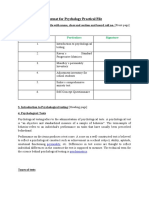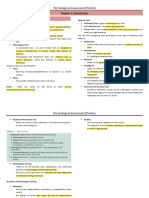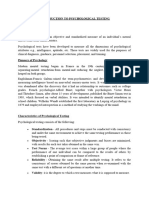Dr.
Sudha
Rathore
� They are tools
and any tool can be an
instrument of good or harm
depending on how it is used
� Traditionally, the function of
psychological tests is to
measure the difference
between individuals or
between the reaction of the
same individual under
different circumstances
�1. Identification of
mentally retarded
persons
-To this day, the detection of
intellectual deficiencies
remain an important
application of certain
types of psychological
� Educational Uses of
Psychological Tests
2. Assessment in
Education
Binet Intelligence Test
a. Classification of children with
reference to their ability
(differentiation of instructions)
b. Identification of outstandingly slow
or fast learners
c. Educational and occupational
counseling of high school and
college students
d. Selection of applicants for
professional schools
�3.Selection and classification of
industrial personnel
-tests proved helpful in matters such as
hiring, job assignment, transfer, promotion
or termination
4.Individual Counseling
-from narrowly defined guidance
regarding educational and
vocational plans to an involvement
with all aspects of a person’s life
-emotional well-being and effective
interpersonal relation have become
increasingly prominent objectives of
counseling
�-there is a growing emphasis on the use of
tests to enhance self-understanding and
personal development
-within this framework, test scores are
given as an aids to one’s decision-
making processes
5. Basic research
-precise measurement of individual
differences is made possible by well-
constructed tests that is a prerequisite
in basic research
-it also provides standardized
tools for investigating varied
� The many kinds of tests designed for
these diverse purposes differ in other
major characteristics
1. They vary in the way they are administered
-e.g. individual testing, simultaneous testing of
large group, or the administration of tests
by computers
2.They also differ in aspects of behavior they
cover
-some concentrate on the assessment of
cognitive traits, or abilities, other tests
provide measure of affective variables, or
personality such as emotional
or
motivational traits, interpersonal behavior,
interests, attitudes and values
� essentially an objective and standardized measure of a
sample behavior
are used to assess a variety of mental abilities and
attributes, including achievement and ability,
personality, and neurological functioning
Personality tests are administered for a wide variety of
reasons, from diagnosing psychopathology (e.g.,
personality disorder, depressive disorder) to screening
job candidates.
They may be used in an educational setting to determine
personality strengths and weaknesses.
�Behavior and Sample
Psychological tests are like the test in
any other science in so far as
observations are made on a small but
carefully chosen sample of an
individual’s behavior
Whether or not the test adequately
covers the behavior under
consideration depends on the number
and the nature of items in the sample
Example: an arithmetic test consisting of
only 5 problems or one including only
multiplication items would be a poor
measure of the individual’s
computational skills
� Diagnoses and Prediction
The diagnostic or predictive value of a
psychological test depends on the degree to
which it serves as an indicator of a
relatively broad and significant area of
behavior
Measurement of the behavior sample directly
covered by the test is rarely the goal of
psychological testing but instead it is
demonstrated that there is a close
correspondence between the applicant’s
score and her performance, if such is the
case, then the tests are serving their purpose
Prediction commonly connotes a temporal
estimate- such as the individual’s future
performance on a job being forecast from his
present test performance
� In a broader sense, diagnosis of
present condition such as
retardation or emotional disorder,
implies a prediction of what the
individual will do in situations other
than the present test.
It is logical then to regard all tests as
behavior samples from which
predictions regarding other behavior
can be made.
Different types of tests can then be
characterized as variants of this
basic pattern
� Psychological tests are formalized measures of
mental functioning.
Most are objective and quantifiable; however,
certain projective tests may involve some level of
subjective interpretation.
Also known as inventories, measurements,
questionnaires, and scales, psychological tests are
administered in a variety of settings, including
preschools, primary and secondary schools, colleges
and universities, hospitals, outpatient healthcare
settings, and social agencies.
They come in a variety of formats, including written,
verbal, and computer administered.
� Proper psychological testing is conducted
after vigorous research and development
in contrast to quick web-based or
magazine questionnaires that say "Find
out your Personality Color," or "What's
your Inner Age?" Proper psychological
testing consists of the following:
Standardization - All procedures and
steps must be conducted with
consistency and under the same
environment to achieve the same testing
performance from those being tested.
� Objectivity - Scoring is free of
subjective judgments or biases based
on the fact that the same results are
obtained on test from everyone.
Test Norms - The average test score
within a large group of people where the
performance of one individual can be
compared to the results of others by
establishing a point of comparison or
frame of reference.
Reliability - Obtaining the same
result after multiple testing.
Validity - The type of test being
administered must measure what it is
intended to measure























































































